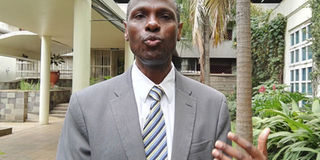Premium
Masinde Muliro, Multimedia warned over engineering courses

KENET Chief Executive Meoli Kashorda at a press briefing after the release of the KENET engineering baseline survey at the Intercontinental Hotel in Nairobi on Tuesday. PHOTO | LILIAN OCHIENG | NATION MEDIA GROUP
What you need to know:
- The EBK accredits only universities whose courses meet five mandatory requirements: programme design, curriculum, adequate faculty staff and training facilities and duration of training.
- KENET says the employability of the engineering students is questionable because of the standards they are exposed to, adding that “many stay unemployed after graduation for even over two years”.
Six universities have been warned against admitting students for engineering courses, because they have not been accredited to do so.
Masinde Muliro University of Science and Technology, Meru University of Science and Technology, Multimedia University of Kenya, Technical University of Kenya and Technical University of Mombasa and University of Eldoret face a Sh5 million fine or a jail term for contravening the directive.
“We sent out warnings for non-accredited universities to stop admitting students to unapproved programmes," said Engineers Board of Kenya registrar Nicholas Musuni.
A survey released Tuesday by the Kenya Education Network (KENET) states that the University of Nairobi, Moi University, Jomo Kenyatta University of Agriculture and Technology, Egerton, Dedan Kimathi University of Technology and Kenyatta University are the only ones accredited by the board.
REQUIREMENTS
The EBK accredits only universities whose courses have met five mandatory requirements: programme design, curriculum, adequate faculty staff and training facilities and duration of training.
“Of the 10,343 engineering students enrolled in Kenyan universities, only 59 per cent of them went through accredited courses,” said Prof Meoli Kashorda, the chief executive of KENET.
“This means that there are over 3,000 students that are studying engineering but they will never be recognised by the EBK.”
Cases of buildings collapsing and substandard roads are attributed to failure to adhere to EBK standards.
KENET says the employability of the engineering students is questionable because of the standards they are exposed, adding that “many stay unemployed after graduation for even over two years”.
The engineering watchdog had last year proposed the introduction of a one per cent levy on infrastructure projects to fund internships for students pursuing technical courses.





